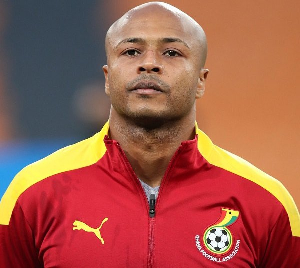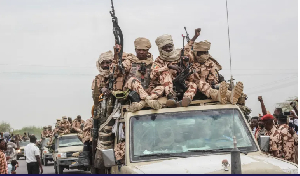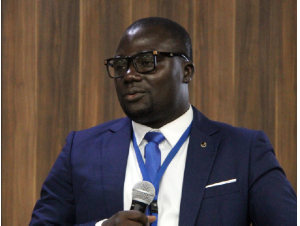The National House of Chiefs supports the current policy of Government to effect constitutional amendments to ensure that chief executives of District, Municipal and Metropolitan Assemblies would be elected not appointed officials.
However, the current focus is on holding a referendum to amend Article 55(3) of the Constitution to permit the introduction of partisan politics into local government. While in principle, this should not be objectionable to the National House of Chiefs, we should take all appropriate steps to ensure that chiefs are not excluded from decision-making in an area where we are major stakeholders.
The current Constitution and other formal structures of governance have marginalized chiefs not only at the level of national government, but also at the level of local government. Whatever the rationale may be for excluding chiefs from Parliament, there is no justification whatsoever for imposing any constitutional and legal prohibitions or limitations on the participation of chiefs in all aspects of local government.
There is no denying that chiefs play a crucial developmental role at the local or regional levels. This is not an extravagant claim of chiefs. It is a fact acknowledged by ministers of state and other officials and even NGOs who continually appeal to chiefs to assist in every development or governance initiative. At our recent meeting with the President at Jubilee House, the President himself acknowledged that Government and chiefs are engaged in the same business of development and good governance and that we should find ways of more effectively collaborating in these fields.
It would be evident to any objective observer that chiefs participate not only in initiating and executing development projects but also in the settlement of disputes, the maintenance of peace the mobilization of people for development and the conduct of campaigns against socially and economically harmful practices, such as galamsey, environmental degradation, and chain saw operations.
THE CURRENT CONSTITUTIONAL POSITION
The Committee of Experts charged with the formulation of proposals for the 1992 Constitution echoed the main themes of the 1969 and 1979 Constitutions on the recognition and guarantee of chieftaincy predicated on the central findings of previous constitutional commissions as to its importance and resilience in our social and cultural life and its role as a vital stabilizing factor. It, therefore, recommended the restoration of the relevant provisions of previous Constitutions which not only guaranteed chieftaincy but also prohibited the introduction of any laws by Parliament to invest the Government with the power of recognizing or withdrawing recognition from chiefs.
It also went further to recommend that appropriate steps be taken to ensure the effective participation of chiefs in local government.
The Committee pointed out that the relationship between the District Assemblies and traditional authorities was ill-defined. The Committee, therefore, urged the Consultative Assembly to find ways for the effective participation of traditional authorities in the work of the District Assemblies.
To this end, the Committee made the following proposals for the consideration of the Consultative Assembly:
1. The appointment of a paramount chief as the ceremonial head of the Assembly, with the right of address;
2. Setting aside a certain percentage of the total membership of the Assembly for traditional authorities and
3. Cooptation of a number of chiefs as members of the Assembly, without the right of vote
The Committee did not consider any of the above measures to be incompatible with democracy.
Unfortunately, the Consultative Assembly did not heed the recommendations of the Committee of Experts. The result is that the 1992 Constitution does not integrate traditional authorities with the local government system. Unlike the Constitutions of 1957, 1969 and 1979, the current Constitution does not provide for institutional representation of Chiefs in District, Municipal and Metropolitan Assemblies nor does it properly define the relationship between traditional bodies and local authorities. The only formal link between the local government structure and traditional authorities is the representation of Regional Houses of Chiefs in Regional Coordinating Councils.
This exclusion ignores the powerful case for integration of the two systems in the Akufo Addo Commission Report and the recommendations in the Report of the Committee of Experts Report on Proposals for the 1992 Constitution.
Aryee (2006) reviews the arguments for and against the representation of chiefs in District and other Assemblies and ends with the following conclusion:
The arguments advanced for and against institutional representation of chiefs in the District Assemblies and the sub-district structures show that there is a compelling case for institutional representation. The relationship between chieftaincy and the District Assemblies and their sub-district structures is ill defined, unclear and imprecise. The positive potential of chieftaincy as a means of mobilizing the people for meaningful development cannot be over-emphasized. Indeed, as earlier on pointed out, local governance in Ghana used to revolve around the institution of chieftaincy. In spite of certain features, which have often given cause for serious concern and the not-altogether-satisfactory record of some chiefs in national life, the institution of chieftaincy has an important and indispensable role in the District Assemblies and the sub-district structures.
Indeed the developmental role of chiefs makes such participation eminently appropriate. Yet the Constitution does not expressly provide for the representation of chiefs in District Assemblies, although their participation as Government appointees in such Assemblies is not precluded. The only pertinent provision in this regard is article 242 (d) which empowers the President, in consultation with the traditional authorities and other interest groups, to appoint up to 30% of the members of the District Assemblies. This does not guarantee the representation of chiefs in the Assemblies. Chiefs are only entitled to consultation in the process of appointment. The practical reality is that the recommendations of traditional authorities are largely ignored, and while some chiefs serve as members or even presiding members in some District Assemblies, chiefs are rather poorly represented in most District Assemblies. This is clearly unsatisfactory since chiefs have a critical interest in the determination and implementation of development projects in the areas of their responsibility. It would, therefore, be highly desirable to promulgate a constitutional amendment which unambiguously provides for the effective representation of chiefs in District Assemblies and other Assemblies. It has in fact been suggested that the 30% of membership now appointed by Government should be ceded to chiefs.
RECOMMENDATION
It is recommended that the representation of chiefs in District, Metropolitan and Municipal Assemblies could be affected by allocating 30% of the membership of such Assemblies to traditional authorities. Such a provision could replace the current system of Presidential appointment of the said 30%. The allocation of this percentage to traditional authorities would enable them to appoint not only chiefs but also knowledgeable and experienced citizens to ensure that the membership of the Assemblies is not dictated exclusively by partisan considerations, but is enriched by the inclusion of skilled personnel.
The House should strongly object to the notion that membership of local assemblies should exclusively comprise representatives of political parties, as in Parliament. The chiefs, as pointed out, are legitimate stakeholders not only by virtue of their status as development partners but also as owners of stool lands in trust for their subjects who contribute 55% of the revenues accruing from stool lands to local assemblies. By every democratic principle, traditional authorities must have a legitimate say in the use of such resources and the selection and location of development projects financed by such revenues.
The marginalization of chiefs in governance has no rationale beyond enhancing the comfort zone of the political class. It is also a legacy of the struggle of the intelligentsia and political activists against chiefs for political power during the colonial and immediate post-colonial era. This struggle is now meaningless with the installation of representative governments. But the introduction of an electoral system should not be used to deprive traditional authorities of their role as effective partners in development and governance.
It has to be pointed out incidentally, that the introduction of partisan policies into local government should not be accompanied by the unwholesome political culture associated with partisan politics.
The incidence of exclusiveness, the unhealthy polarization of all issues, the marginalization of citizens who do not belong to the ruling party and the exclusion, of skilled manpower on partisan grounds would be detrimental to development and good governance at the local level. Currently the appointment of 30% Government nominees to local assemblies has been totally vitiated by partisan politics, with the result that appointments are determined by party membership to the virtual exclusion of traditional authorities which are usually allocated a minimal representation by the executive of the ruling party – a total travesty of principles of good governance. It has been argued that the proposed local government reforms would ultimately lead to inclusive government in the country.
This is only marginally valid in the sense that the election of chief executives of districts etc. could result in the coexistence of central government and local government controlled by different political parties. However, at the local level experience clearly demonstrates that the culture of “winner takes all” would prevail to the detriment of united development endeavours.
It should also be pointed out that effective decentralization would be adversely affected by the control of local parties by the headquarters of national political parties.
TECHNICAL ASPECTS OF THE PROPOSED REFORMS AND THE ROAD MAP
I note that the Ministry of Local Government and Rural Development is preoccupied with the amendment of Article 55(3) of the Constitution because it is an entrenched provision of the Constitution. Article 55(3) prohibits the sponsoring by political parties of candidates for election to District Assemblies or Local Government Units.
I am, however, surprised that the Roadmap or indeed the IDEG paper hardly mentions crucial provisions of the Constitution which have to be amended in order to ensure the full democratization of the local government system even though they are not entrenched. The Roadmap does indeed mention the subsequent amendment of Article 243 and the Local Government Act 2016 (Act 936). But, in my submission, a paper or policy dealing with the introduction of democratic processes into local government should address upfront all the relevant provisions of the Constitution, which are as follows:
*The above-mentioned Article 55(3)
*Article 242(d) which includes in the membership of District Assemblies, “other members not being more than thirty per cent of all the members of the District Assembly, appointed by the President in consultation with the traditional authorities and other interest groups in the district.”
*Article 243 (1) which reads; “There shall be a District chief Executive for every district who shall be appointed by the President with the prior approval of not less than two-thirds majority of members of the Assembly present and voting at the meeting.” and
*Article 248 which complements Article 55(3) in the following emphatic terms:
*A candidate seeking election to a District Assembly or any lower local government unit shall present himself to the electorate as an individual, and shall not use any symbol associated with any political party.
*Article 248 which complements Article 55(3) in the following emphatic terms:
*A candidate seeking election to a District Assembly or any lower local government unit shall present himself to the electorate as an individual, and shall not use any symbol associated with any political party.
Although the above additional provisions are not entrenched, they should be fully addressed and catered for in the main Roadmap or any policy paper dealing with the reform of the local government system. It must be stressed that the amendment of Article 55(3) would not, technically speaking, amend any of the crucial provisions of Chapter Twenty i.e. Decentralization and Local Government, which constitute impediments to the inauguration of a fully democratic local government. These provisions are not consequential matters but key aspects which need to be addressed holistically in a general review of policy on local governance. Moreover, there can be no consequential amendment of the Local Government Act without a prior amendment of all of the above constitutional provisions.
This means that the entire local government reform programme would probably take a much longer period than is envisaged in the Roadmap. As I understand the strategy, a referendum will be conducted this year to amend Article 55(3). This will be followed by the so-called “consequential” amendments of the other provisions of the Constitution and the Local Government Act later. However, the Local Government Act cannot be amended until Article 242(d), 243(1) and 248 have been amended.
It is therefore impractical to design a roadmap which does not make provision for an intervening period between the amendment of the entrenched constitutional provisions and the Local Government Act.
It is manifestly inaccurate to declare to the general public that the amendment of Article 55(3) would automatically result in the introduction of the system of electing chief executives of Local Assemblies. The true constitutional position is that the amendment of Article 55(3) would achieve no such objective without the amendment of Article 248 which complements Article 55(3) and Article 243(1) which governs the appointment of District, Municipal and Metropolitan Chief Executives. The democratization of local government would also be incomplete without the repeal of Article 242(d) which provides for presidential appointment of 30% of the membership of District, Municipal and Metropolitan Assemblies.
At his recent lecture delivered on Constitution Day, Professor Bondzi-Simpson, recommended the promulgation of a Government White Paper to address all aspects of local government reforms. I would strongly endorse the issuance of such a policy paper which addresses all aspects of local government reforms including the representation of chiefs, a comprehensive analysis of the constitutional steps, the allocation of resources to local authorities and the reduction of central government control over local authorities.
Respectfully submitted,
Nana S. Krobea Asante
Asokorehene and Chairman of the Committee of Legal Affairs
of the National House of Chiefs
22nd January 2019
General News of Wednesday, 20 November 2019
Source: thechronicle.com.gh

















